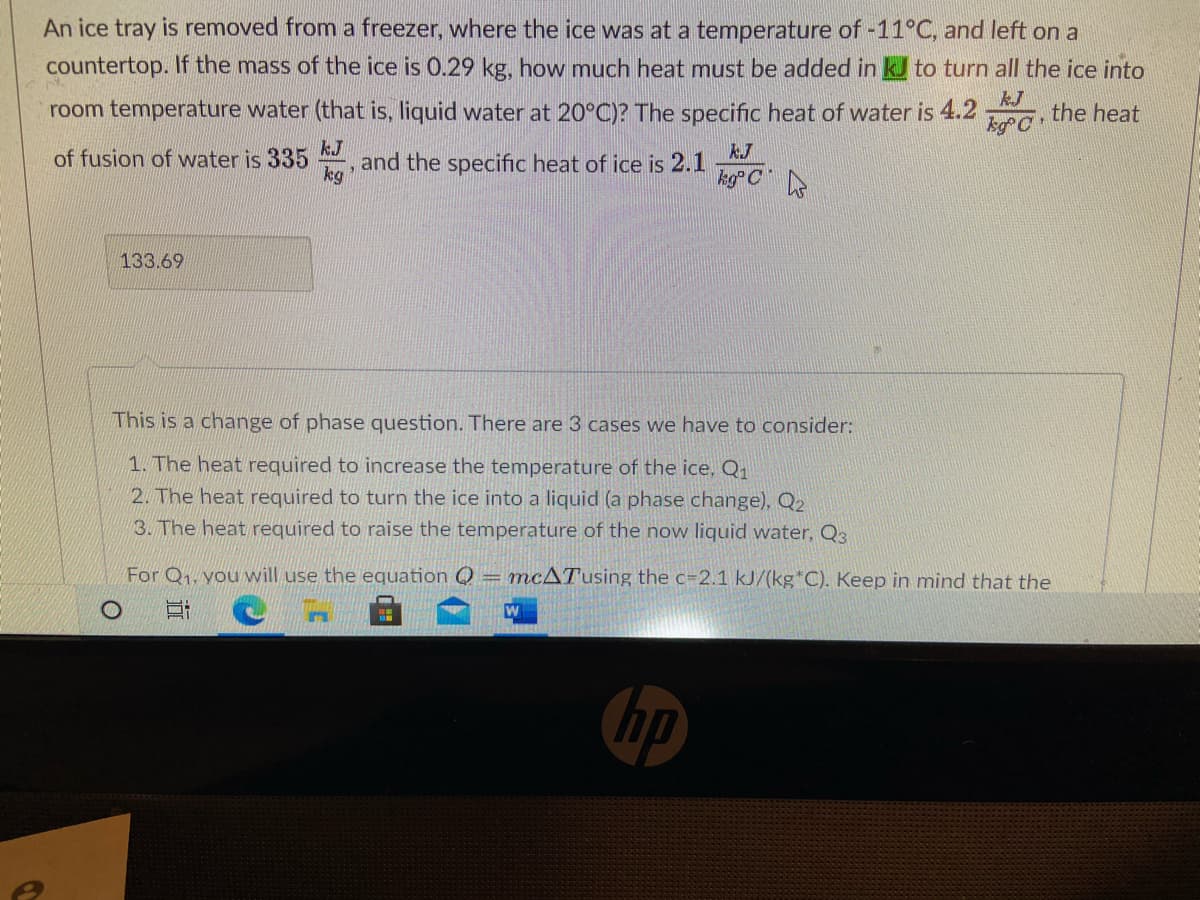An ice tray is removed from a freezer, where the ice was at a temperature of -11°C, and left on a countertop. If the mass of the ice is 0.29 kg, how much heat must be added in k to turn all the ice into kJ room temperature water (that is, liquid water at 20°C)? The specific heat of water is 4.2 kg C the heat kJ of fusion of water is 335 kg kJ and the specific heat of ice is 2.1 kg° C
An ice tray is removed from a freezer, where the ice was at a temperature of -11°C, and left on a countertop. If the mass of the ice is 0.29 kg, how much heat must be added in k to turn all the ice into kJ room temperature water (that is, liquid water at 20°C)? The specific heat of water is 4.2 kg C the heat kJ of fusion of water is 335 kg kJ and the specific heat of ice is 2.1 kg° C
Chapter1: Temperature And Heat
Section: Chapter Questions
Problem 48P: A person taking a reading of the temperature in a freezer in Celsius makes two mistakes: first...
Related questions
Question

Transcribed Image Text:An ice tray is removed from a freezer, where the ice was at a temperature of -11°C, and left on a
countertop. If the mass of the ice is 0.29 kg, how much heat must be added in k to turn all the ice into
room temperature water (that is, liquid water at 20°C)? The specific heat of water is 4.2
kgC
kJ
the heat
of fusion of water is 335
kg
kJ
and the specific heat of ice is 2.1
kg°C*
133.69
This is a change of phase question. There are 3 cases we have to consider:
1. The heat required to increase the temperature of the ice, Q1
2. The heat required to turn the ice into a liquid (a phase change), Q2
3. The heat required to raise the temperature of the now liquid water, Q3
For Q1, you will use the equation Q = mcATusing the c=2.1 kJ/(kg*C). Keep in mind that the
hp
Expert Solution
This question has been solved!
Explore an expertly crafted, step-by-step solution for a thorough understanding of key concepts.
This is a popular solution!
Trending now
This is a popular solution!
Step by step
Solved in 2 steps

Knowledge Booster
Learn more about
Need a deep-dive on the concept behind this application? Look no further. Learn more about this topic, physics and related others by exploring similar questions and additional content below.Recommended textbooks for you


Principles of Physics: A Calculus-Based Text
Physics
ISBN:
9781133104261
Author:
Raymond A. Serway, John W. Jewett
Publisher:
Cengage Learning

Physics for Scientists and Engineers, Technology …
Physics
ISBN:
9781305116399
Author:
Raymond A. Serway, John W. Jewett
Publisher:
Cengage Learning


Principles of Physics: A Calculus-Based Text
Physics
ISBN:
9781133104261
Author:
Raymond A. Serway, John W. Jewett
Publisher:
Cengage Learning

Physics for Scientists and Engineers, Technology …
Physics
ISBN:
9781305116399
Author:
Raymond A. Serway, John W. Jewett
Publisher:
Cengage Learning

Physics for Scientists and Engineers: Foundations…
Physics
ISBN:
9781133939146
Author:
Katz, Debora M.
Publisher:
Cengage Learning

College Physics
Physics
ISBN:
9781285737027
Author:
Raymond A. Serway, Chris Vuille
Publisher:
Cengage Learning

College Physics
Physics
ISBN:
9781938168000
Author:
Paul Peter Urone, Roger Hinrichs
Publisher:
OpenStax College